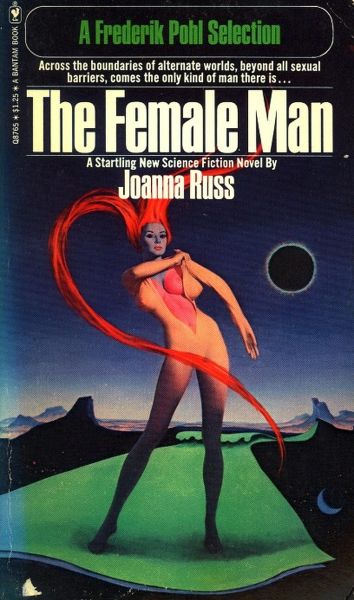Sleep Like A Baby
The Female Man
By Joanna Russ

6 Oct, 2024
Joanna Russ’ 1975 The Female Man is a stand-alone feminist science fiction novel.
Joanna, Jeannine, Janet, and Jael are four different women from four very different worlds. What thread binds the quartet together?
In a distant future, Whileaway’s human society not only survived the death of all men, it thrived. Thanks to cloning, eugenics, and other advanced biotechnologies, the people of Whileaway are very nearly super-women. That said, someone has to be at the low end of the bell curve. Janet is that person, which makes her ideal as an expendable explorer.
There is no way to reach their own past. There is, however, a way to reach the pasts of other timelines. For example, suitably advanced technology could send Janet to Jeannine’s 1969.
In Jeannine’s world, the Nazis proved a damp squib, World War Two never happened, the Winds of Change blew fitfully at best, and the Depression never really ended. Consequently, jobs are reserved for men and women like Jeannine are forced to depend on men for financial support. Jeannine does at least have a beau, but he is so unpromising that he doesn’t even rate being named.
Janet and Jeannine then travel to Joanna’s 1969 world, which is much like our own (at least of the time when this novel was written). While the status of women is better in Joanna’s world than it is in Jeannine’s, that is more a measure of how awful Jeannine’s world is than how wonderful ours was. An astonished Janet is unimpressed by American sexual inequality.
At this point, Jael intrudes into the narrative. Jael’s world has a literal war of the sexes, with women on one side and men on the other. Jael sees nothing wrong with the relentless violent struggle1. In fact, she would like to export it.
~oOo~
Let me begin with a suggestion that I suspect is both wrong and novel: I wonder if Larry Niven lifted the idea of the struggle between Boys and Girls in A World Out of Time from skimming the sections about Jael’s world? Of course, that would require him to have read Russ, which seems unlikely.
On a more plausible note: since this is set in a multiverse of parallel timelines, it is perfectly reasonable to consider every single Russ work, including the non-fiction, to share this universe with The Female Man. Indeed, How To Suppress Women’s Writing would fit in very nicely.
The above synopsis imposes on the narrative a structure readers may strain to see. Russ cheerfully switches perspectives as the whim takes her, and she does not care to clearly delineate one viewpoint from another. Russ firmly rejects conventional plot structure, shifting the spotlight as it pleases her. Also, there are sections that appear to be Russ’ own commentary.
Each woman relates to men in a different way: for Jeannine they are an economic necessity, for Joanna an irksome impediment, for Jael the enemy, and for Janet, they are irrelevant. All would agree men are mostly disappointing at best, infuriating at worst. Janet is the only one for whom men are not an ongoing complication, or threat.
How was this novel was received at the time2? Russ’ fellow writers nominated it for a Nebula3. It was not a Hugo finalist, but no novel by a woman was a Hugo finalist that year. It’s clear that reviewers did pay attention; the ISFDB lists seven reviews from 1975 alone4. Pringle included The Female Man in his Science Fiction: The 100 Best Novels.
Unsurprisingly, the general tone is frustration and incandescent fury. Consider the times in which Russ was writing; she would not have been able to get a credit card in her name, legally pursue redress for workplace sexual harassment, and in some jurisdictions, serve on a jury. When Russ wrote The Female Man, she would have been hard-pressed to foresee how society would evolve. Imagine how astonished Russ be to learn of recent American Supreme Court decisions.
Perhaps Russ would not have been so surprised.
The Female Man is available here (Amazon US), here (Amazon Canada), here (Amazon UK), here (Apple Books), here (Barnes & Noble), here (Chapters-Indigo), and here (Words Worth Books).
1: Jael is almost certainly a terf. On that note, the novel’s portrayal of trans people may well not please, as they are all draftees forcibly surgically altered to address the lack of women to abuse in the men’s world.
2: I do remember a reviewer losing his shit over We Who Are About To… but of course that’s a different novel.
3: Haldeman’s The Forever War won that year’s Nebula. The Female Man placed 4th, after The Forever War, Niven and Pournelle’s the Mote in God’s Eye, and Delany’s Dhalgren, in that order.
Normally I would list all of the nominees but this particular year had an absurd number, too many to list.
4: Monte Davis in The Science Fiction Review, March 1975; Richard E. Geis in Science Fiction Review, May 1975; Lester del Rey (1975) in Analog Science Fiction/Science Fact, June 1975; Alan Brennert and Susan Wood (1975) in Delap’s F & SF Review, June 1975; Richard A. Lupoff in Algol, #24, Summer 1975; Robert Randolph Medcalf, Jr in Locus, #176 July 20, 1975; and Alexei Panshin and Cory Panshin in The Magazine of Fantasy and Science Fiction, August 1975.
Del Rey hated this book (no surprise). Geis is more positive than I expected from him, but ultimately dismisses Russ’ thesis (and commits a factual error about the novel in doing so). The other reviews I could not locate.
